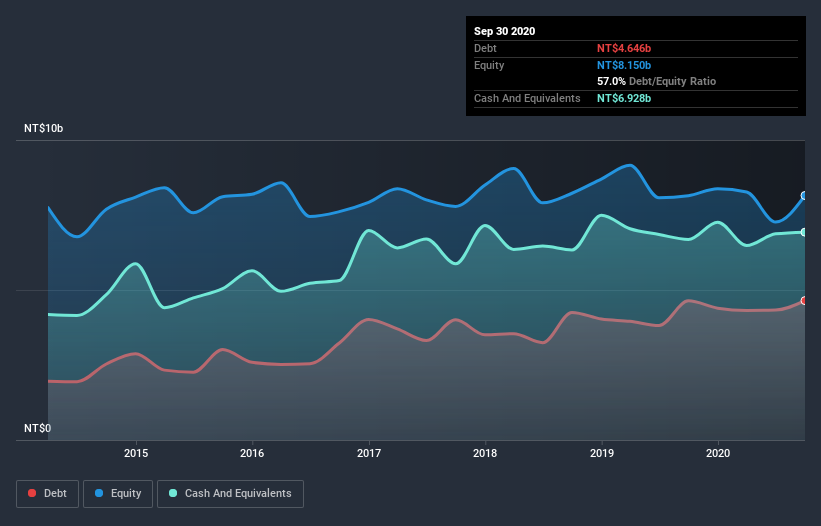- Taiwan
- /
- Electronic Equipment and Components
- /
- TWSE:2373
Aurora (TPE:2373) Seems To Use Debt Rather Sparingly
The external fund manager backed by Berkshire Hathaway's Charlie Munger, Li Lu, makes no bones about it when he says 'The biggest investment risk is not the volatility of prices, but whether you will suffer a permanent loss of capital.' So it might be obvious that you need to consider debt, when you think about how risky any given stock is, because too much debt can sink a company. We note that Aurora Corporation (TPE:2373) does have debt on its balance sheet. But is this debt a concern to shareholders?
Why Does Debt Bring Risk?
Debt and other liabilities become risky for a business when it cannot easily fulfill those obligations, either with free cash flow or by raising capital at an attractive price. If things get really bad, the lenders can take control of the business. However, a more usual (but still expensive) situation is where a company must dilute shareholders at a cheap share price simply to get debt under control. Having said that, the most common situation is where a company manages its debt reasonably well - and to its own advantage. The first thing to do when considering how much debt a business uses is to look at its cash and debt together.
See our latest analysis for Aurora
What Is Aurora's Net Debt?
As you can see below, Aurora had NT$4.65b of debt, at September 2020, which is about the same as the year before. You can click the chart for greater detail. But on the other hand it also has NT$6.93b in cash, leading to a NT$2.28b net cash position.

A Look At Aurora's Liabilities
According to the last reported balance sheet, Aurora had liabilities of NT$6.21b due within 12 months, and liabilities of NT$2.78b due beyond 12 months. Offsetting this, it had NT$6.93b in cash and NT$1.69b in receivables that were due within 12 months. So its liabilities outweigh the sum of its cash and (near-term) receivables by NT$371.0m.
Having regard to Aurora's size, it seems that its liquid assets are well balanced with its total liabilities. So it's very unlikely that the NT$19.8b company is short on cash, but still worth keeping an eye on the balance sheet. While it does have liabilities worth noting, Aurora also has more cash than debt, so we're pretty confident it can manage its debt safely.
Aurora's EBIT was pretty flat over the last year, but that shouldn't be an issue given the it doesn't have a lot of debt. When analysing debt levels, the balance sheet is the obvious place to start. But it is Aurora's earnings that will influence how the balance sheet holds up in the future. So if you're keen to discover more about its earnings, it might be worth checking out this graph of its long term earnings trend.
Finally, a company can only pay off debt with cold hard cash, not accounting profits. Aurora may have net cash on the balance sheet, but it is still interesting to look at how well the business converts its earnings before interest and tax (EBIT) to free cash flow, because that will influence both its need for, and its capacity to manage debt. During the last three years, Aurora generated free cash flow amounting to a very robust 96% of its EBIT, more than we'd expect. That puts it in a very strong position to pay down debt.
Summing up
While it is always sensible to look at a company's total liabilities, it is very reassuring that Aurora has NT$2.28b in net cash. The cherry on top was that in converted 96% of that EBIT to free cash flow, bringing in NT$1.4b. So is Aurora's debt a risk? It doesn't seem so to us. The balance sheet is clearly the area to focus on when you are analysing debt. However, not all investment risk resides within the balance sheet - far from it. For example, we've discovered 2 warning signs for Aurora that you should be aware of before investing here.
Of course, if you're the type of investor who prefers buying stocks without the burden of debt, then don't hesitate to discover our exclusive list of net cash growth stocks, today.
If you’re looking to trade Aurora, open an account with the lowest-cost* platform trusted by professionals, Interactive Brokers. Their clients from over 200 countries and territories trade stocks, options, futures, forex, bonds and funds worldwide from a single integrated account. Promoted
New: Manage All Your Stock Portfolios in One Place
We've created the ultimate portfolio companion for stock investors, and it's free.
• Connect an unlimited number of Portfolios and see your total in one currency
• Be alerted to new Warning Signs or Risks via email or mobile
• Track the Fair Value of your stocks
This article by Simply Wall St is general in nature. It does not constitute a recommendation to buy or sell any stock, and does not take account of your objectives, or your financial situation. We aim to bring you long-term focused analysis driven by fundamental data. Note that our analysis may not factor in the latest price-sensitive company announcements or qualitative material. Simply Wall St has no position in any stocks mentioned.
*Interactive Brokers Rated Lowest Cost Broker by StockBrokers.com Annual Online Review 2020
Have feedback on this article? Concerned about the content? Get in touch with us directly. Alternatively, email editorial-team (at) simplywallst.com.
About TWSE:2373
Aurora
Provides office automation equipment, office furniture, communications, cloud HR, 3D printer, and office cloud and electronics in Taiwan, China, and internationally.
Excellent balance sheet average dividend payer.
Market Insights
Community Narratives



